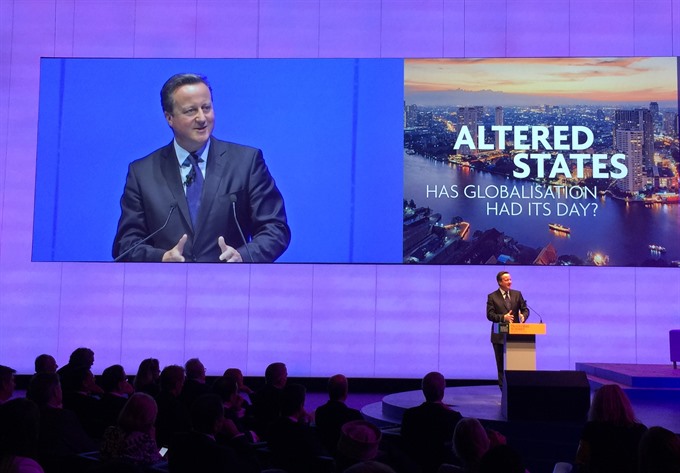 World
World

The 2017 World Travel and Tourism Summit began Wednesday in Bangkok, Thailand with more than 900 leading figures in the travel and tourism industry from across the world attending.
 |
| Former UK Prime Minister David Cameron gives a speech at the 2017 WTTC. — VNS Photo Hoàng Anh |
BANGKOK — The 2017 World Travel and Tourism Summit began Wednesday in Bangkok, Thailand with more than 900 leading figures in the travel and tourism industry from across the world attending.
Paticipants include Prime Minister of Thailand Prayut Chan-o-cha, former UK Prime Minister David Cameron and Secretary General of UN World Tourism Organisation Taleb Rifai.
Prime Minister Prayut Chan-o-cha spoke of the importance of the tourism industry to Thailand and other ASEAN countries. The bloc has launched a programme to promote ASEAN-wide tourism under the slogan “VisitASEAN@50” for the bloc’s 50th anniversary this year.
During the opening speech David Scowsill, President and CEO of World Travel and Tourism Council (WTTC) – a leading authority in world travel and tourism industry based in the UK, urged industry leaders to take the initiative to lead the world on a path to eradicate poverty, clean up the oceans and protect habitats.
The WTTC president highlighted the contribution the industry has made to the global economy, with a total value of US$7.6 trillion generated globally – roughly 10 per cent of world GDP. Global tourism, which has maintained consistently high growth in recent years, provides more than 292 million jobs, equals to one in ten existing jobs worldwide.
The industry is also the driving force behind three out of 17 sustainable development goals (SDGs) proposed by the UN in 2015, including the promotion of inclusive and sustainable economic growth and decent work for all, sustainable consumption and production patterns and the conservation and sustainability of the oceans, seas and marine resources.
The industry is also expected to play a key supporting role in realising the remaining SDGs.
At the summit, political leaders and industry experts discussed the rise of populism, nationalism and terrorism and how it will affect the industry in the backdrop of last year’s UK ‘Brexit’, the US presidential election and terrorist attacks across Europe.
Extreme measures taken by governments to tighten border controls and security such as the US government’s recently entry ban for citizens from six countries are also challenges.
However, industry leaders believed that travel helps people understand and respect each others cultures and histories.
“I believe that closed borders lead to closed minds; that travel makes the world a better, more peaceful place and that human encounters across cultures change us for the better,” Scowsill said. He also said that travel is among human fundamental rights, regardless of nationality, gender, religion, sexual orientation or age.
Discussing the rising anti-globalisation, former UK Prime Minister David Cameron said while the benefits of globalisation are plain to see, the course of globalisation must be corrected to bring benefits to more people and their concerns on culture, border control and immigration must be listened to.
“There are two things we need to achieve here. The first is to continue to enable more people to trade, to travel, to experience new places, to enjoy the world. And the second is to ensure people aren’t able to go where they aren’t allowed to or stay somewhere long after they are meant to go home.”
He proposed improving border control technology and urged industry leaders to work with governments to retain the benefits of globalisation.
The summit this year, which will conclude on Thursday, will also focus on emerging markets with vast potential such as China and India as well as improving co-operation mechanisms for countries to work together to develop travel and tourism. — VNS




